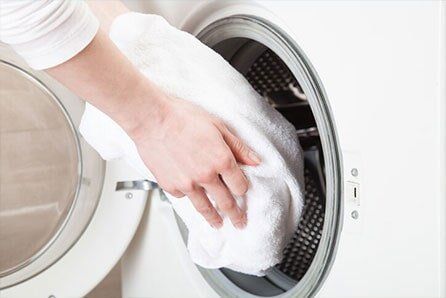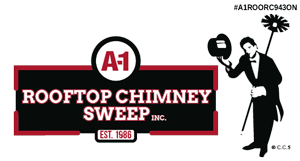Masonry Repair in Spokane, WA
Masonry Repairs:
Fireplace Remodeling: Remove your existing stone and replacing it with a more modern look by using Cultured Stone.
Rebuilding: Tear down your existing chimney and can rebuild from roofline using, new or existing bricks and or cultured stone.
Tuckpointing: Replace Missing or Loose Mortar in Brick Or Rock Chimneys and buildings.
If we can catch a chimney before it deteriorates to the point that rebuilding is required, we can use a method called tuck pointing to restore structural integrity to your chimney. We remove loose mortar and replace it with new, providing an economical solution and making your chimney looks good as new.
Rebuilding: Tear down your existing chimney and can rebuild from roofline using, new or existing bricks and or cultured stone.
Tuckpointing: Replace Missing or Loose Mortar in Brick Or Rock Chimneys and buildings.
If we can catch a chimney before it deteriorates to the point that rebuilding is required, we can use a method called tuck pointing to restore structural integrity to your chimney. We remove loose mortar and replace it with new, providing an economical solution and making your chimney looks good as new.
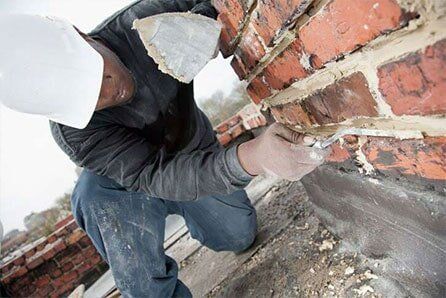
Masonry Repairs:
Fireplace Remodeling: Remove your existing stone and replacing it with a more modern look by using Cultured Stone.
Rebuilding: Tear down your existing chimney and can rebuild from roofline using, new or existing bricks and or cultured stone.
Tuckpointing: Replace Missing or Loose Mortar in Brick Or Rock Chimneys and buildings.
If we can catch a chimney before it deteriorates to the point that rebuilding is required, we can use a method called tuck pointing to restore structural integrity to your chimney. We remove loose mortar and replace it with new, providing an economical solution and making your chimney looks good as new.
Concrete Crown: The best way to stay safe and save money is to prevent problems from occurring. To stop deterioration due to water damage, your chimney sweep may recommend a Crown Seal to prevent water penetration through the top of your chimney, or a Crown replacement for chimneys with more severe deterioration.
Rebuilding: Tear down your existing chimney and can rebuild from roofline using, new or existing bricks and or cultured stone.
Tuckpointing: Replace Missing or Loose Mortar in Brick Or Rock Chimneys and buildings.
If we can catch a chimney before it deteriorates to the point that rebuilding is required, we can use a method called tuck pointing to restore structural integrity to your chimney. We remove loose mortar and replace it with new, providing an economical solution and making your chimney looks good as new.
Concrete Crown: The best way to stay safe and save money is to prevent problems from occurring. To stop deterioration due to water damage, your chimney sweep may recommend a Crown Seal to prevent water penetration through the top of your chimney, or a Crown replacement for chimneys with more severe deterioration.
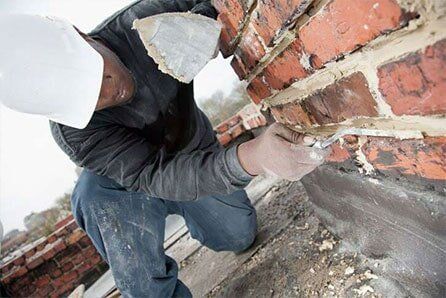
Concrete Crown: The best way to stay safe and save money is to prevent problems from occurring. To stop deterioration due to water damage, your chimney sweep may recommend a Crown Seal to prevent water penetration through the top of your chimney, or a Crown replacement for chimneys with more severe deterioration.
Chimney Sweeping/ Inspection:
- Removing dangerous creosote from inside the chimney.
As wood and other fuels burn, the by-products of combustion flow away from the fire and up the chimney. Because the chimney is cooler than the fire, condensation occurs. This means that soot and other materials collect and form a residue called creosote that sticks to the interior of your chimney. Creosote is a highly flammable substance, and if it is not regularly removed, creosote may ignite and cause dangerous chimney fires.
Our Turbo Sweep, Industrial Grade Sweep Vacuum has better suction, and has special soot filters, so there's no possibility of the vacuum blowing soot and residue on your carpet, drapes, and furniture. We use a rotational cleaning device that is quick and effective, we inspect the chimney with lights and /or mirrors, if you or the sweep would like a better view we carry a CHIM-scan chimney camera on the truck which enables us to perform an internal inspection to see areas you would not normally be able to
A multipoint inspection and/or video inspection will determine if your chimney system meets current safety standards and enable us to provide an in-depth condition diagnosis.
As wood and other fuels burn, the by-products of combustion flow away from the fire and up the chimney. Because the chimney is cooler than the fire, condensation occurs. This means that soot and other materials collect and form a residue called creosote that sticks to the interior of your chimney. Creosote is a highly flammable substance, and if it is not regularly removed, creosote may ignite and cause dangerous chimney fires.
Our Turbo Sweep, Industrial Grade Sweep Vacuum has better suction, and has special soot filters, so there's no possibility of the vacuum blowing soot and residue on your carpet, drapes, and furniture. We use a rotational cleaning device that is quick and effective, we inspect the chimney with lights and /or mirrors, if you or the sweep would like a better view we carry a CHIM-scan chimney camera on the truck which enables us to perform an internal inspection to see areas you would not normally be able to
A multipoint inspection and/or video inspection will determine if your chimney system meets current safety standards and enable us to provide an in-depth condition diagnosis.
Relining:
Gives new life to unlined or damaged chimneys that would otherwise have to be completely rebuilt from the ground up. We use Homesaver Chimney Liner the industry leader and have been to their school and install to their instructions and specs. We have received homesaver’s Top 50 in the nation award for the last 17 years. We offer liners for wood, oil, pellet, and gas flues. Gas flue relining is similar, but they are manufactured to handle gas furnace fumes. A new gas flue liner helps prevent deadly carbon monoxide from penetrating through your deteriorated or blocked chimney. Our installers have been to chimney lining training.
Rain Cap:
Prevents Rain, Animals, Leaves and Debris. Obstructions in your chimney can cause fire and carbon monoxide hazards. The easiest way to prevent these problems is to install a chimney cap.
Waterproofing:
Protects Chimneys from Rain and Water Damage. Chimneys are damaged by extreme temperatures, snow, sunrays, wind, and rain. Damage from rainwater is particularly common because bricks are so porous that they soak up water like a sponge. The American Brick institute says that you don't want to put a sealer on exterior brick. Water can still get in but can't get out. The result is a damaged chimney, and it's is a serious problem. Inspections and recommendations, you can rest easy knowing your home is protected.
Chimney Sweeping/ Inspection:
- Removing dangerous creosote from inside the chimney.
As wood and other fuels burn, the by-products of combustion flow away from the fire and up the chimney. Because the chimney is cooler than the fire, condensation occurs. This means that soot and other materials collect and form a residue called creosote that sticks to the interior of your chimney. Creosote is a highly flammable substance, and if it is not regularly removed, creosote may ignite and cause dangerous chimney fires.
Our Turbo Sweep, Industrial Grade Sweep Vacuum has better suction, and has special soot filters, so there's no possibility of the vacuum blowing soot and residue on your carpet, drapes, and furniture. We use a rotational cleaning device that is quick and effective, we inspect the chimney with lights and /or mirrors, if you or the sweep would like a better view we carry a CHIM-scan chimney camera on the truck which enables us to perform an internal inspection to see areas you would not normally be able to see.
As wood and other fuels burn, the by-products of combustion flow away from the fire and up the chimney. Because the chimney is cooler than the fire, condensation occurs. This means that soot and other materials collect and form a residue called creosote that sticks to the interior of your chimney. Creosote is a highly flammable substance, and if it is not regularly removed, creosote may ignite and cause dangerous chimney fires.
Our Turbo Sweep, Industrial Grade Sweep Vacuum has better suction, and has special soot filters, so there's no possibility of the vacuum blowing soot and residue on your carpet, drapes, and furniture. We use a rotational cleaning device that is quick and effective, we inspect the chimney with lights and /or mirrors, if you or the sweep would like a better view we carry a CHIM-scan chimney camera on the truck which enables us to perform an internal inspection to see areas you would not normally be able to see.
Relining:
Gives new life to unlined or damaged chimneys that would otherwise have to be completely rebuilt from the ground up. We use Homesaver Chimney Liner the industry leader and have been to their school and install to their instructions and specs. We have received homesaver’s Top 50 in the nation award for the last 17 years. We offer liners for wood, oil, pellet, and gas flues. Gas flue relining is similar, but they are manufactured to handle gas furnace fumes. A new gas flue liner helps prevent deadly carbon monoxide from penetrating through your deteriorated or blocked chimney. Our installers have been to chimney lining training.
Rain Cap:
Prevents Rain, Animals, Leaves and Debris. Obstructions in your chimney can cause fire and carbon monoxide hazards. The easiest way to prevent these problems is to install a chimney cap.
Waterproofing:
Protects Chimneys from Rain and Water Damage. Chimneys are damaged by extreme temperatures, snow, sunrays, wind, and rain. Damage from rainwater is particularly common because bricks are so porous that they soak up water like a sponge. The American Brick institute says that you don't want to put a sealer on exterior brick. Water can still get in but can't get out. The result is a damaged chimney, and it's is a serious problem. Inspections and recommendations, you can rest easy knowing your home is protected.
Stove Sales & Installations:
If you have been heating your home with the same old woodstove you have had for years, it is time to upgrade to a modern wood or gas burning stove. Although you may love your trusty old stove, you are not getting as much efficiency as you could be with a new stove. Your older stove is probably also producing more creosote. Reasons to upgrade your woodstove or insert by being Eco-Friendly, cut energy costs, exceptional heating, placement flexibility, works during power outage. Pacific Energy and Blaze King Stoves are eco-friendly, cut energy costs, exceptional heating placements flexibility, works during power outage.
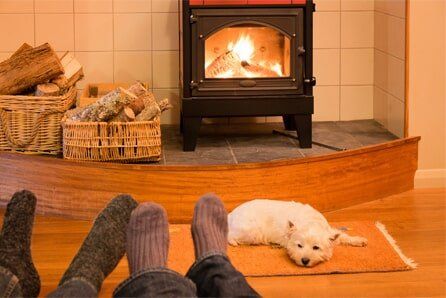
Stove Sales & Installations:
If you have been heating your home with the same old woodstove you have had for years, it is time to upgrade to a modern wood or gas burning stove. Although you may love your trusty old stove, you are not getting as much efficiency as you could be with a new stove. Your older stove is probably also producing more creosote. Reasons to upgrade your woodstove or insert by being Eco-Friendly, cut energy costs, exceptional heating, placement flexibility, works during power outage. Pacific Energy and Blaze King Stoves are eco-friendly, cut energy costs, exceptional heating placements flexibility, works during power outage.
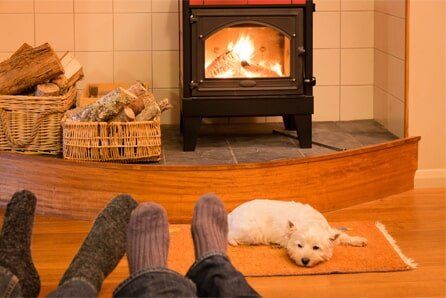
Dryer Vent:
Dryer vents build up lint, and lint is highly flammable. There are about 15,000 dryer vent fires each year due to improperly serviced (or neglected) vents. Lint buildup also forces your dryer to work harder, and that costs you more money on your electric bill. Our high-powered air and soft mechanical brushes clean dryer vents to foster better air circulation, prevent fire hazards, and improve efficiency.
Duct Cleaning:
Air ducts accumulate debris and dust. If they are not regularly and properly cleaned, they can contribute to high levels of dirt, dust mites, pollen, mold, mildew, allergens, and other contaminants building up in your vents. This fosters an unhealthy environment. Our trained technicians use HEPA filtration vacuums to safely remove these harmful contaminants and provide your living space with healthier, cleaner air.
Dryer Vent:
Dryer vents build up lint, and lint is highly flammable. There are about 15,000 dryer vent fires each year due to improperly serviced (or neglected) vents. Lint buildup also forces your dryer to work harder, and that costs you more money on your electric bill. Our high-powered air and soft mechanical brushes clean dryer vents to foster better air circulation, prevent fire hazards, and improve efficiency.
Duct Cleaning:
Air ducts accumulate debris and dust. If they are not regularly and properly cleaned, they can contribute to high levels of dirt, dust mites, pollen, mold, mildew, allergens, and other contaminants building up in your vents. This fosters an unhealthy environment. Our trained technicians use HEPA filtration vacuums to safely remove these harmful contaminants and provide your living space with healthier, cleaner air.
